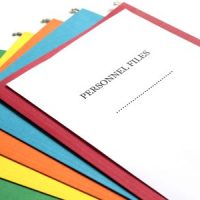What California Employers Need To Know About Personnel Files

Section 1198.5 of the California Labor Code grants current and former employees (or their representative) the right to receive and inspect a copy of their personnel record from an employer. Once an employer receives a request for a personnel file, they are obligated to provide access “at reasonable times and at reasonable intervals,” but in no case more than 30 calendar days after receiving a written request. (The employee may agree, in writing, to extend that deadline to 35 calendar days.)
Because of these disclosure requirements, every California employer needs to be careful when deciding what documents it wishes to keep in an employee’s personnel file. There are certain documents that may need to be kept confidential or otherwise do not really belong in a personnel file. With that in mind, here are some basic guidelines for what should – and should not – be kept in the typical employee file.
What to Include in a Personnel File
Broadly speaking, any non-confidential information regarding an employee’s tenure should be kept in their personnel file. This includes, but is not limited to, the following documents and documentation:
- The employee’s job description;
- The employee’s job application, CV, or resume;
- Any written offer of employment made to the employee;
- Any employment contracts or related documents, such as a non-disclosure agreement or arbitration agreement;
- The employee’s withholding allowance certificate (IRS Form W-4);
- Any forms related to compensation or employee benefits;
- The Notice to Employee form required by California Labor Code Section 2810.5;
- The employee’s emergency contact or next-of-kin information;
- If the employer has a handbook or written policy manual, the employee’s signature regarding receipt and acknowledgment of such documents;
- Worker’s Compensation forms, including Form 9783 (pre-designation of personal physician or chiropractor) and Form 9783.1 (notice of personal chiropractor or acupuncturist);
- Any records documenting the employee’s attendance or leaves of absences;
- The employee’s performance evaluations, including any performance improvement plans; and
- Any disciplinary records, including write-ups, suspensions, or notices of termination.
What Not to Include in a Personnel File
As previously noted, there are certain documents related to an employee that should not be kept in a personnel file subject to disclosure under Section 1198.5. Some of the items that should be kept in a separate, confidential file instead may include:
- Any records related to the investigation of a potential criminal offense by the employee;
- Any letters of reference about the employee;
- The employee’s medical records, workers compensation records, or other health records, including any COVID-19-related attestations or disclosures;
- Any internal communications regarding the employee, including any notes kept by supervisors or any other sensitive information intended exclusively for internal use;
- Any communications between the employee and your own legal counsel;
- The employee’s USCIS Form I-9 (employment eligibility verification); and
- Any ratings, reports, or records obtained prior to the employee’s employment or obtained in connection with a promotional examination.
Speak with a Coachella Valley Employment Lawyer Today
If you need more specific legal advice tailored to your company on how to maintain personnel files properly and would like to speak with a qualified Riverside County & Coachella Valley employment lawyer for employers, contact Sloat Law Group, today.
Source:
leginfo.legislature.ca.gov/faces/codes_displaySection.xhtml?lawCode=LAB§ionNum=1198.5
